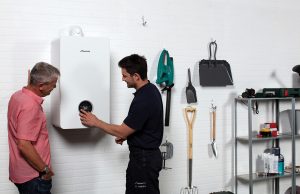
Traditionally, the majority of homeowners in the UK have relied on gas central heating to heat their properties. However, with the push to adopt clean energy and minimise our carbon footprint, Governments and energy companies around the world are looking to harness the electrical energy provided by renewable sources such as solar, wind, geothermal and hydroelectric power. Renewable energy is set not only to replace fossil fuels, but also to drive down the price of electricity. As a consequence, house builders may soon start to install electric heating systems, changing the way houses are designed and built in the very near future. But if your boiler is on its last legs, is it time to do away with a boiler altogether and switch to an electric system? Here are five reasons this might be a good idea:
- Minimally invasive to install
Traditional boilers burn gas to heat water, this is then pumped to radiators around a house via a system of pipework. Installing or upgrading this system is incredibly invasive and time consuming, as well as costly. An electric system is comprised of an electric boiler or immersion heater to provide hot water, with electric radiators installed for heating. Electric systems tend to be far less invasive – boilers can be small in size and can be installed anywhere within a property, with no need for ventilation; while electric radiators are very straightforward and easy to install, simply requiring a wall mounting and connection to a power supply. Visit Radiatoroutlet if you wish to buy a new radiator.
- Superior heating control
Traditional systems use a thermostat, placed in a central location. The heating of the entire house will be switched on and off depending on the temperature in this area, meaning you’re also paying to heat empty rooms. Even individual thermostats on radiators can’t compensate for this feature. New intelligent heating systems such as Hive can be programmed for zones, but this tech is in its infancy and requires set programming of the zones. In contrast, electric radiators can easily be activated individually, with thermostats controlling their temperature and ensuring only the heat required is produced.
- Increased efficiency
Electric boilers will provide a 99% efficiency rate for the user, as opposed to gas boilers which lose heat through a chimney or flue and only reach 95% efficiency. The way that heat is distributed around a home by a gas boiler is also inherently going to create heat loss, as the water moves along the pipes from one radiator to another. In contrast, electric radiators heat up very quickly, with every single watt of electricity converted into heat, maximising efficiency.
- Save money on servicing and maintenance
Not only is a traditional gas boiler expensive to install, but it will also require annual maintenance checks, as well as monitoring for carbon monoxide emissions. If anything goes wrong with your boiler, repair costs can also be prohibitive if you don’t have an annual maintenance contract. With an electric boiler, there are very few mechanical parts and no emissions, meaning no servicing is required and a warranty can cover any replacement parts. Additionally, electric radiators can also easily be repaired or replaced on an individual basis.
- Reduce your carbon footprint
Renewable energy is now rapidly becoming a viable option to provide reliable, sustainable energy for the future. Testament to this, in June of this year, energy from renewable sources – including solar, wind, hydro and wood pellet burning – provided more than half of UK electricity for the first time ever. This drive towards an electric future will impact many areas of our lives – from the cars we drive to how we power our homes – allowing us all to contribute to a carbon-neutral future and minimising the impact we have on our environment.













